In many ways, we are the anti-parents in America. There are many panting norms that we do not believe in or follow. Most of our parenting differences fall in the “children should be allowed to be children” category.
This means we don’t believe toddlers should be in “school”. We don’t believe pre-schoolers should be “learning” while at school. We don’t believe young elementary school students should have homework. We don’t believe young children need to be enrolled in numerous extra-curricular activities.
We believe all these things because we know children learn through playing and that pushing children into early school, learning and activities does not make a difference in their future development, growth or potential. We know that what does make a difference is providing children with a stable, loving and supportive growing environment where they feel secure and able to explore, learn and make mistakes on their own.
When Honeybun was a baby we had a discussion about what our children were going to “be” and what activities we would put them in. We agreed that our children could be and do anything they wanted (with the exception of soccer…we have no interest in being soccer parents!). While we still hold this opinion, the way we approach extra-curriculars for our girls has evolved over time as we have gotten to know the individually.
We waited until Honeybun was 4 before enrolling her in any extra-curriculars. Last fall I gave her the choice to ballet, tap and jazz or gymnastics. She chose ballet and I’m so glad she did not because I was (am?) a ballerina but because I now see that it suits her. She is the type of child that would prefer to sit on the couch and read books (or ideally watch TV) than run around outside. She has also been a good direction follower but is very hesitant to try new things. All of these traits come in handy for ballet where classes are comprised of listening/watching, doing, listening/watching, doing and students are expected to stay in one place while listening/ watching, doing. This is not a skill that comes easily to all children and can make ballet class frustrating for both the child and teacher.
Sugarplum is the later child and the polar opposite of Honeybun. She is the run around, be loud, flip over the back of the couch and resist direction following type of child. She is also insanely flexible and unusually strong so we decided to encourage her to try gymnastics rather than ballet. She has now completed 6 weeks of gymnastics classes and is loving it! 45 minutes of jumping, flipping, balancing and non-stop moving.
When I enrolled Sugarplum in gymnastics, Honeybun really wanted to do it too but we have decided to limit them each to 1 activity and class per week. This is due to cost but also time. At 3 and 5 years, my children don’t need multiple days of activities. What they will learn in a year now they could easily learn in a month when they are older so activities at this point are more for social development and learning respect and listening skills.
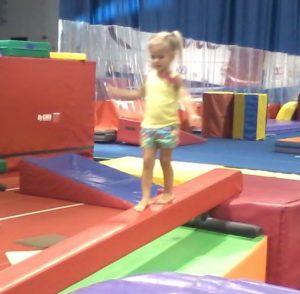 Both girls are excelling in their own activity. Honeybun ‘s ballet teacher (who happens to also be one of my students) tells me often how great she is doing and that she is a “super star!” And just today Sugarplum got switched to another gymnastics teacher that is working on a more advanced skill set and one of the staff told me she is “really very good.”
Both girls are excelling in their own activity. Honeybun ‘s ballet teacher (who happens to also be one of my students) tells me often how great she is doing and that she is a “super star!” And just today Sugarplum got switched to another gymnastics teacher that is working on a more advanced skill set and one of the staff told me she is “really very good.”
If either girl ever wants to switch, I will of course let them try but at tis time I feel they have each found their individual niche in which they can be successful. I also really like that they each have their own set of skills to be proud of and there is no comparing who is doing better because they are both doing great at their own things.

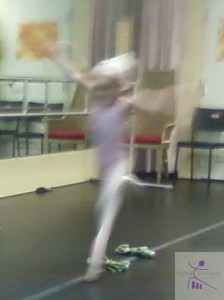


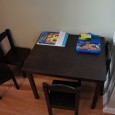

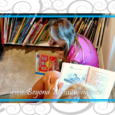
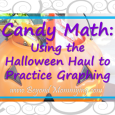
I’ve noticed a theme in your blog entries – that you have observed parenthood and childhood have become over engineered – from giving birth to school, to extra activities. I completely agree with you and appreciate how you articulate this aspect of American? Western? culture.
Thanks, Jen. I think I am more aware of it for a few reasons: 1) my time abroad, immersed in a different culture, really brought to light what is DIFFERENT here (not always “wrong”) and 2) my background in Early Childhood Education and understanding of what is proven to be most appropriate for young children often conflicts with what I see happening in my children’s lives outside of our home. This causes me to often question WHY things are generally done a certain way and to analyze how I feel about situations and make decisions based on what I feel is right for my children and family (with hubby’s help and opinions of course!) I really think we’ve come to a place where you really have to advocate for yourself, your children and your family because no one else will do it, most parents just go along for the ride assuming the “authorities” and/or society knows best and unfortunately the norm is often arbitrary and in no way based on what the research says (this goes for many things from how we birth our babies to the effectiveness of homework and school uniforms).